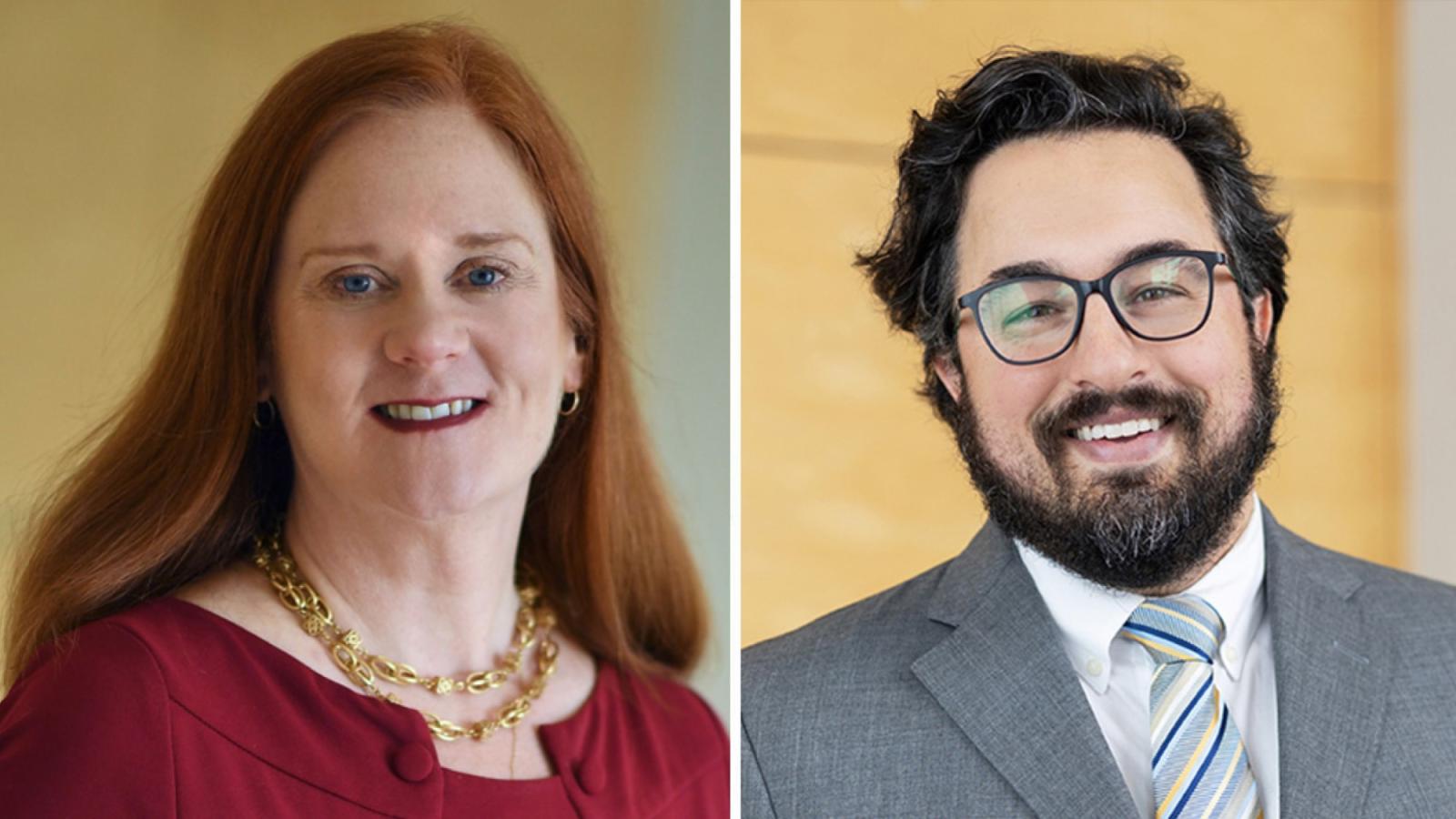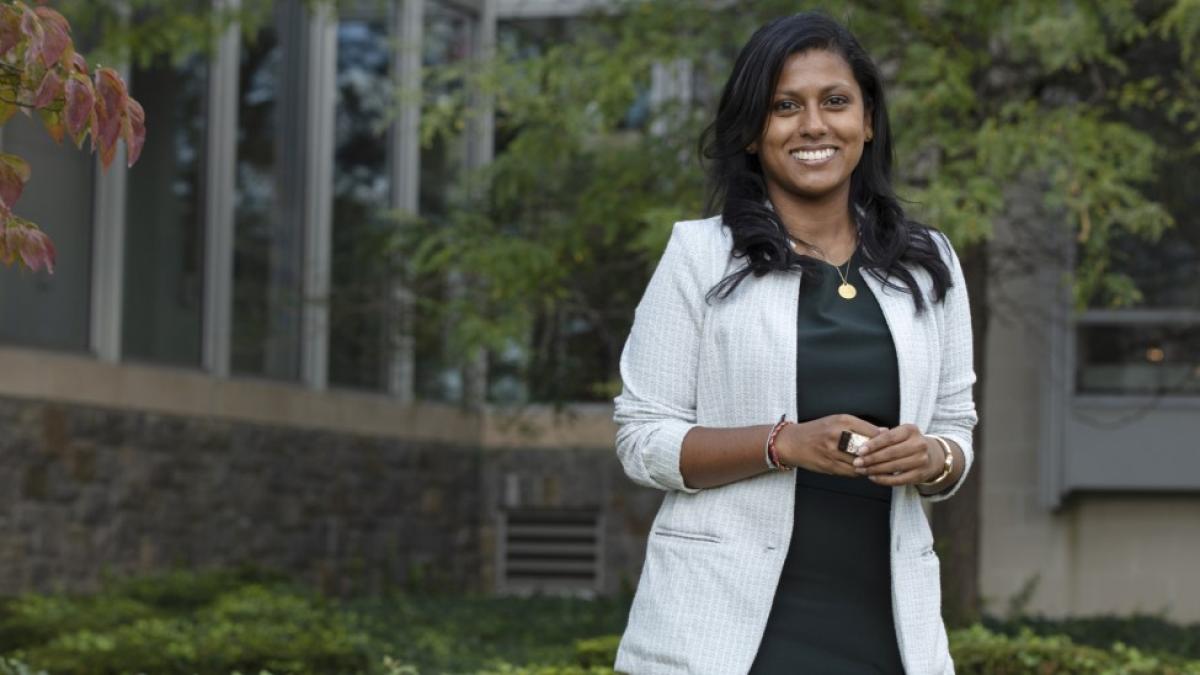The Elisabeth Haub School of Law at Pace University is proud to announce that Achinthi Vithanage, Executive Director of the Environmental Law Program and Professor of Law for Designated Service in Environmental Law at Pace Haub Law, was named to the 2026 Lawdragon 500 Leading Environmental Lawyers: The Green 500. Professor Vithanage has been recognized on this list five times since the publication of the inaugural Lawdragon 500 Leading Environmental & Energy Lawyers list in 2021.
2025 Goettel Prize for Faculty Scholarship Awarded to Professors Bridget Crawford and Josh Galperin

The Elisabeth Haub School of Law at Pace University is proud to announce two winners of the 2025 Goettel Prize for Faculty Scholarship. University Distinguished Professor of Law Bridget J. Crawford received the award for her article Taxing Sugar Babies, in the Minnesota Law Review (109 Minn. L. Rev. 737 (2024)) and Associate Professor of Law Josh Galperin received the award for his article Interpreting Congress, in the Wisconsin Law Review (2025 Wis. L. Rev. 89 (2025)).
The Goettel Prize was created in 2004 to encourage and recognize outstanding scholarship by members of the Elisabeth Haub School of Law at Pace University faculty. Each year, members of the tenured and tenure-track faculty are invited to submit their work for consideration (on an anonymous basis) by a selection committee of outside reviewers. This year's committee consisted of three distinguished professors: Professor Miriam Cherry, St. John’s University School of Law; Professor Christopher Hampson, University of Florida Levin College of Law; and Professor Sharona Hoffman, Case Western Reserve University School of Law. This year’s selection committee review resulted in a tie, and thus there were two winners of the 2025 Goettel Prize for Faculty Scholarship.
“Professor Bridget Crawford has delivered a fascinating article in Taxing Sugar Babies,” said 2025 Goettel Award selection committee member Professor Chrisopher Hampson. “Her analysis is relevant for anyone who ponders the nature of work, value, contracts, morality, sex, stigma, and more. Crawford builds her conclusions upon the results of a meticulous, IRB-approved study of Reddit subpages. Besides being an adept way of studying sugaring, Crawford’s method will prove generative for legal scholars in other areas.”
Professor Crawford’s article, Taxing Sugar Babies, analyzes online discussions among sugar daddies/mamas and sugar babies to explore how taxation intersects with the stigmatization of sex work. The dominant narrative frames sugar baby payments as “gifts,” while tax professionals counter that they are taxable income. Crawford argues that although taxation is legally appropriate, enforcement is unlikely, leaving sugaring in a gray area between intimacy and sex work. This “gift” rhetoric sustains stigma, deprives sugar babies of labor protections and benefits, and diminishes recognition of their risks and contributions. “I’m honored to receive this recognition,” said Professor Crawford. “Through my article, I hope to draw attention to the complex realities of sugaring, the tax implications that are often overlooked, and the broader conversations about stigma, fairness, and recognition in sex work.”
Of Professor Galperin’s article, 2025 Goettel Award selection committee member Professor Sharona Hoffman noted that, “Interpreting Congress is an ambitious, illuminating, and thought-provoking paper. It makes a very valuable contribution to the statutory interpretation literature.”
In the article, Professor Galperin introduces the concept of congressional interpretation, a judicial strategy in which courts infer congressional intent from assumptions about legislative behavior rather than from statutes or legislative history. This practice, evident in cases like Loper Bright v. Raimondo and Biden v. Nebraska, blends textualism with unacknowledged assumptions about Congress, subtly but significantly reshaping separation-of-powers principles. Galperin argues that failing to recognize this interpretive method undermines judicial legitimacy, while the method’s deregulatory outcomes suggest policy-driven motives. Using noise law as a case study, the article calls for more transparency and consistency in how courts use congressional interpretation. “I am flattered the readers thought this was a valuable article,” remarked Professor Galperin. “Congressional interpretation is becoming a very common practice, but one that is getting little attention even though it profoundly affects separation of powers, agency authority, and the legitimacy of courts. I hope my article will spur more discussion.”
Associate Dean for Faculty Development and Professor of Law Emily Gold Waldman commented: “I’m so pleased that we had the opportunity to recognize both of these articles this year. They highlight the depth and breadth of our faculty’s scholarly impact. Professor Crawford sheds light on how narratives around taxation both reflect and reinforce social stigmas, while Professor Galperin illuminates how the Supreme Court’s interpretive practices have the potential to reshape fundamental separation-of-powers principles. Together, their work demonstrates how legal scholarship can uncover hidden dynamics in law and spark important conversations about legitimacy and the role of law in society.”
Professor Bridget J. Crawford joined the faculty of the Elisabeth Haub School of Law at Pace University in 2003. She teaches courses in Federal Income Taxation; Estate and Gift Taxation; and Wills, Trusts and Estates. Prior to joining the faculty, Professor Crawford practiced at Milbank, Tweed, Hadley & McCloy LLP (now Milbank LLP). From 2008 to 2012, and again in 2014 to 2015, she served as Pace Haub Law’s Associate Dean for Research and Faculty Development. In 2021, Professor Crawford received the title of University Distinguished Professor—the highest honor the University bestows on a member of the faculty. Professor Crawford’s scholarship focuses on taxation—especially wealth transfer taxation—property law, feminist legal theory, and the intersection of gender and tax policy. Her work has appeared in leading journals and she has written and edited several books. Professor Crawford currently serves as the President of the American Tax Policy Institute and she is a Fellow of the American College of Trust and Estate Counsel (ACTEC), a Fellow of the American College of Tax Counsel (ACTC), and a member of the American Law Institute.
Professor Joshua Galperin is the Faculty Director of the Sustainable Business Law Hub. He joined the Elisabeth Haub School of Law at Pace University faculty in July 2021. Before that, Professor Galperin was on the faculty at the University of Pittsburgh School of Law. Prior to his time at the University of Pittsburgh, Professor Galperin was the Director of the Environmental Protection Clinic, Lecturer in Law, and a Research Scholar at Yale Law School. He also serves as a Visiting Professor of Law at Yale Law School. His research and teaching interests include environmental law, administrative law, food and agriculture law and policy, property, constitutional law, and tort law. He has published extensively on environmental law and has also written about food and agriculture law and policy, particularly in terms of intersections with environmental policy and administrative law doctrine.


